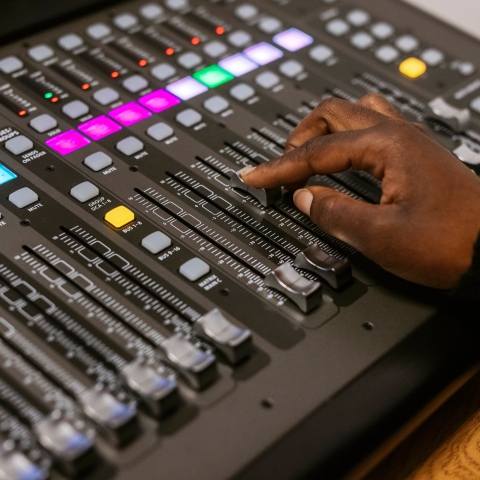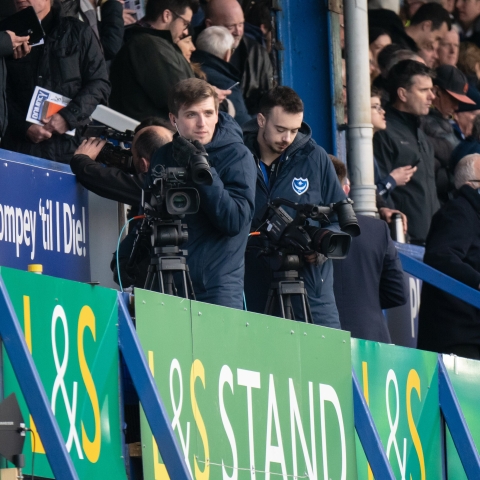
Competition for jobs in television and radio is fierce and work experience could be the deciding factor to securing a job within the sector. Not only will you gain an understanding of the type of work undertaken and the various roles, but you will also have the chance to develop a network of contacts for the future.
Types of Opportunities
Below are some examples of the different types of opportunities to gain experience while you study.
Placements will give you a long-term look at an organisation, and help you to build contacts and experience.
On some degrees, work placements are part of the programme, whilst on others you can choose to complete a placement as one of your modules. Should you choose to undertake either your first point of contact is your placement team.
Learn more about taking a placement
Many students from the Faculty of Creative and Cultural Arts choose to take a Self-Employed Placement. This allows you to work for yourself during your placement year and receive support from the University's Student Startup Team. You will have access to funding opportunities, networking events and workshops.
Learn more about Self-Employed Placements
It is worth considering the voluntary sector for work experience. Voluntary work with community art initiatives can be valuable. Seize any opportunity to get involved in local community projects to help you develop your work experience. Our Volunteering Bank provides local opportunities to undertake alongside your studies.
You can also get involved in relevant university projects through the different groups and societies via the Student Union. This is a good way of demonstrating your motivation and interest in this area of work.
Learn more about our Volunteering Team
Internships are usually for a fixed period and give you more hands-on experience. Many employers will treat interns in the same way as full-time employees, so when future job roles ask for 'at least one year's experience' you can include an internship in this type of experience.
You can find internships for television and radio through:
Be proactive and try to gather inspiration and ideas from the world around you: join creative clusters and attend networking events. This is a great way to meet people working in the creative industries and will help you with your networking skills. LinkedIn is a useful platform to network with sector employers.
You can also speak to your tutors in the Faculty of Creative and Cultural Industries about potential contacts and opportunities for work experience over the Easter period or summer vacation.
This is an opportunity for you to spend time with an experienced professional and learn about what they do and their role.
Whatever experience you gain will help your understanding of the skills required in the television and radio field. It will also give you an idea of the challenges and triumphs of the creative process.
Where to find work experience opportunities
Work experience in the television and radio sector can be invaluable. Some platforms to use to find opportunities or make speculative approaches to include:
Listed below are examples of large companies and agencies offering and advertising work experience in this sector. You will need to do thorough research to identify further specific opportunities.
- allaboutcareers – Includes a useful internships and work placements section which could assist in sourcing relevant opportunities
- Absolute Radio – For students studying a media related course; all placements are two weeks unless otherwise arranged with opportunities being advertised on amplifi.
- Community Media Association – Includes a regularly updated section showing latest voluntary vacancies at radio stations across the UK
- Screen Global Production – International guide to 40,000 film, television and commercial production service companies in 149 countries; searchable database is a useful resource for students looking for placements, internships or career opportunities in film and TV
- The Knowledge – Comprehensive production directory for UK Film and TV contacts
- BBC – the BBC's searchable work experience pages
- Channel 4 – Offer work experience opportunities within a range of departments including audience research, media planning, press and publicity, continuity, advertising research and many more
- Global Radio – one to three months unpaid opportunities
- Banijay UK – Creative Internship scheme, three months paid work experience
- Video Collective - A UK based job board and search engine for freelancers seeking work in the Film and TV industry. Lists Film, TV, and Video Production jobs.
- FremantleMedia – Offer three month internships based in London
- PACT – The trade association for independent production companies has a searchable directory of members; use this information to make speculative applications
- allaboutcareers – Includes a useful internships and work placements section which could assist in sourcing relevant opportunities
- The Knowledge – Comprehensive production directory for UK Film and TV
- Tiger Aspect Productions – Offer the occasional placement on a shoot/production.; placements will last for one to two weeks
- The Knowledge – Comprehensive production directory for UK Film and TV. Use this information to make speculative applications
- Video Collective - A UK based job board and search engine for freelancers seeking work in the Film and TV industry. Lists Film, TV, and Video Production jobs.
- British Film Industry (BFI) – Organisation has responsibility for funding film development and production, training, distribution and exhibition in the UK; offers paid internships
- allaboutcareers – Includes a useful internships and work placements section which could assist in sourcing relevant opportunities
- Screen Global Production – International guide to 40,000 film, television and commercial production service companies in 149 countries; searchable database is a useful resource for students looking for placements, internships or career opportunities in film and TV
- Company Pictures – Independent film and television drama Production Company, offering work experience to students who are enrolled on an educational course
Tips to build experience
Explore the various areas within the media sector before you apply for work experience; knowing what you want to specialise in will help you focus your research and ensure you gain the relevant skills.
- Get involved in relevant university or external groups, volunteer on your student newspaper or get involved in student radio or hospital/community radio - all of these roles are a good way to demonstrate your motivation and interest in this area of work.
- Enter competitions and attend external workshops to help build a network of contacts.
- Speak to your tutor researching in the areas that interest you, as students are sometimes recruited to work on specific projects over the summer.
- Be proactive and make direct contact with organisations that interest you and apply speculatively; send a targeted CV and a covering letter focused on why you are interested in working for them and why they should be interested in you.
- Create a LinkedIn profile to network with sector employers – see our Networking and Social Media section for further guidance.
- Research companies and agencies offering summer internships, vacation placements, taster experience or introductory courses.
- There are around 120 commercial radio stations and 180 community radio stations in the UK and the majority will regularly take on people for work experience. This is many people's route into the radio industry and experience within radio is often valued in television as well.
- Most work experience opportunities in television and radio will not be advertised and instead be through speculative approaches. Identify companies you would like to work for, find potential contacts through company websites and LinkedIn pages and be prepared to contact a lot of people before one says yes!
- Try to maintain as strong an online presence as possible, both through your social media accounts such as Twitter and LinkedIn but also any personal blog or vlog spots and YouTube channels. If you have produced content then make it easily accessible.
- Gain experience with the University of Portsmouth's own media channels, Victory Studios and CCI TV.
- Some of the biggest media companies in the UK such as the BBC, Sky and ITV run internships and work experience programmes though these are extremely competitive.
How to approach employers directly
When you approach an employer directly, you send them a speculative application. Speculative applications involve sending a CV and cover letter to an employer to ask if they can offer any work experience, even if the company is not currently advertising placements or internships.
Submitting a speculative application shows your interest in a specific company and your willingness to go above and beyond to develop your skills and understanding of the industry.
Learn how to send a speculative application

Television and radio career guide
Your guide to building a career in television and radio.

Getting started in television and radio
Take the first steps to beginning your career in television and radio.

Finding a job in television and radio
Explore different ways you can find employment in television and radio after you graduate.







